和身体器官有关的英语习语
与身体部位有关的英语习语

与身体部位有关的英语习语1. HeadThe head is thought to be the most important part of the human body. So a leader is often compared to a head (首脑). Thus we have Head of State or the head of a delegation.The head is where the brain is located. It is naturally associated with ideas and intelligence. Very often, we need other people's ideas and opinions when we want to do something well. The is because two heads are better than one (三个臭皮匠顶个诸葛亮).2. EyeThe eyes are extremely precious to us. That is why we say" Mind your eye (当心)! when we reminding someone to be careful.Not only human beings and animals have eyes, many things also have" eyes"- the eyes ofa ship, the eye of a needle, the eye of a typhoon, and so on.3. EarThe ear is the organ of hearing. A piece of light music is easy on the ear. (悦耳动听). We are usually all ears (专心聆听) for bit news.When they think somebody is overhearing, English people use either of the two proverbs: Walls have ears (隔墙有耳) and Pitchers have ears (壶罐有耳). They also think that little pitchers have big ears(小孩子耳朵尖). Nice boys and girls respect other people. They will not secretly listen to others' private conversations.4. NoseThe English phrase "face to face (面对面)" and its Chinese counterpart(对应)are exactly the same. But English people, to express the same idea, can say nose to nose instead. There is no such substitute in Chinese.The word nose appears in many idioms. Here are two which are quite similar to their Chinese equivalents: lead somebody by the nose (牵着某人的鼻子走) and turn up one's nose at somebody or something (对某人或某物嗤之一鼻).English people can say as plain as the nose in one's face (一清二楚) to mean "very obvious". May be to them, the nose is the most conspicuous part of the face.5. LipWe have two lips: the upper lip and the lower lip. If one's two lips are closed, one cannot speak. So it goes without saying that "don't open your lips (不要开口)" means " don't speak".His lips are sealed. Are his lips really stuck together by wax or glue? No, his lips are sealed when asked about something that he must keep secret. Sometimes a top secret is betrayed because it has escaped someone's lips (脱口而出). Then the incident may become a piece of news that is on everybody's lips (众口相传).6. TongueWe all know we cannot speak without the tongue. So the tongue is closely related to speech. To hold one's tongue (保持沉默) means "to keep silent". A person who has too much tongue (太多嘴) is disliked by all, for he is too talkative. Mother tongue is not the tongue of a mother: it is a person's native language."Don't you have a moth below your nose (你鼻子底下不是有张嘴吗)?" The Chinese sayso to blame a person who did not say what he should have said. But this not the right way to express the idea in English. English people would say, "You have a tongue in your head, haven't you?"7. FaceFace has to do with the idea of respect and dignity both in Chinese and English. You lose your face (丢面子) if you fail again and again, but a decisive victory will save your face (挽回面子) after all your failures.When you feel unhappy, you pull a long face (拉长脸). The idea is conveyed in Chinese in the same way. But "about face (向后转)" does not refer to the face. It is a military order to turn round and face in the opposite direction. It is the exact equivalent of " about turn".8. ShoulderThe shoulders can bear heavy things. Your father has a great responsibility for the family on his shoulder. When faced with difficulty, the family should stand shoulder to shoulder (肩并肩) to overcome it. You should not turn a cold shoulder (不理睬) to your family members. Nor should you give your friends the cold shoulder (冷落朋友). Both expressions mean treating others coldly.9. BackA good host is hospitable to his guests. But, if guest is tiresome, the host is glad to see his back (他离开).If your friend has done something really well, you may give him a pat on the back (轻轻拍背部) to show your appreciation.If you turn your back on somebody (不理睬他人), you mean you do not like making friends with that person.10. HeartThe heart is an extremely important organ inside the chest. It usually stands for something important or the centre of something, for example, the heart of the matter (问题的核心) or the heart of mystery.Many other expressions make use of the word heart. A lover can be called a sweet heart (情人). The Purple Heart (紫心徽章) is a medal given as an honor to American soldiers wounded in battle.If your friend is in trouble, you may encourage him by saying "Don't lose heart (不要灰心)."11. StomachThe stomach is naturally related to one's appetite. If you dislike heavy food, you have no stomach for it (反胃). The word is also related to one's interests or likings. If you find something boring or vulgar, you have no stomach for it, either. Bad food turns your stomach. Similarly, your stomach turns at a bad joke.Stomach can also be a verb. Look at this example: "How could you stomach (忍受) such rude words?" Apparently, stomach here can be replaced by "tolerate".12. ArmEvery person has two arms: the right arm and the left arm. The right arm is usually stronger, so we call a good helper the right arm (得力助手).We all know an arm is not very long. But when you keep someone at arm's length (保持距离), the distance is long enough. For that means you don not like that person and you try your best to avoid him or her. We should indeed keep the bad friends at arm's length.13. HandQuite a number of phrases formed form the word hand are very similar to their Chinese counterparts. Here are some obvious examples: a fresh hand (新手), short of hands (人手短缺), hand in hand (手拉手) and wash one's hands of something (洗手不干了). But do not always take this for granted. Study these examples and you will understand.He lives from hand to mouth (He has just enough money to live on). We gave them a big hand (We gave them lots of applause).14. FingerHow many fingers does each of your hands have? Now let's name them in English from the smallest: the little finger, the ring finger, the middle finger, the index finger and thumb.Each finger has its own part to play. If your fingers are all thumbs (笨拙), that is too bad. That means you are very clumsy.15. ThumbChinese people turn up their thumbs to express appreciation. English people do so to express not only appreciation but also approval. Chinese people never turn their thumbs down to mean anything. But English people do. They do so to show depreciation disapproval. Thus in English you can say, "We turn thumbs up (赞成) to Jack's suggestion but they turn thumbs down (不赞成) to it."Similarly, you can warmly praise someone by saying "Thumbs up (真棒)!" and show your dissatisfaction by saying "Thumbs down (差劲)!"16. SkinMost people will only think of the hair on our head when the word hair is mentioned. In fact, some animals and plants also have hair.A horrible scene may make a person's hair stand on end (毛骨悚然). But a courageous person will not turn a hair (不畏惧) even though he is in face of danger.Sometimes, a friend of yours may be so angry that he may act foolishly. Then you had better give him this advice: "Keep your hair on (别发脾气)".Selected from the book The Human Body by Huang Juanhua。
最新身体部位英语习语50句
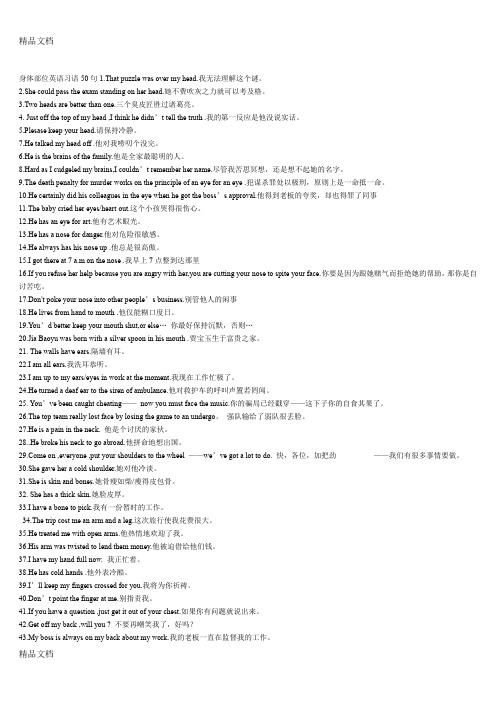
身体部位英语习语50句1.That puzzle was over my head.我无法理解这个谜。
2.She could pass the exam standing on her head.她不费吹灰之力就可以考及格。
3.Two heads are better than one.三个臭皮匠胜过诸葛亮。
4. Just off the top of my head ,I think he didn’t tell the truth .我的第一反应是他没说实话。
5.Plesase keep your head.请保持冷静。
7.He talked my head off .他对我唠叨个没完。
6.He is the brains of the family.他是全家最聪明的人。
8.Hard as I cudgeled my brains,I couldn’t remember her name.尽管我苦思冥想,还是想不起她的名字。
9.The death penalty for murder works on the principle of an eye for an eye .犯谋杀罪处以极刑,原则上是一命抵一命。
10.He certainly did his colleagues in the eye when he got the boss’s approval.他得到老板的夸奖,却也得罪了同事11.The baby cried her eyes/heart out.这个小孩哭得很伤心。
12.He has an eye for art.他有艺术眼光。
13.He has a nose for danger.他对危险很敏感。
14.He always has his nose up .他总是很高傲。
15.I got there at 7 a.m on the nose .我早上7点整到达那里16.If you refuse her help because you are angry with her,you are cutting your nose to spite your face.你要是因为跟她赌气而拒绝她的帮助,那你是自讨苦吃。
有关人体身体部位的英文谚语习语
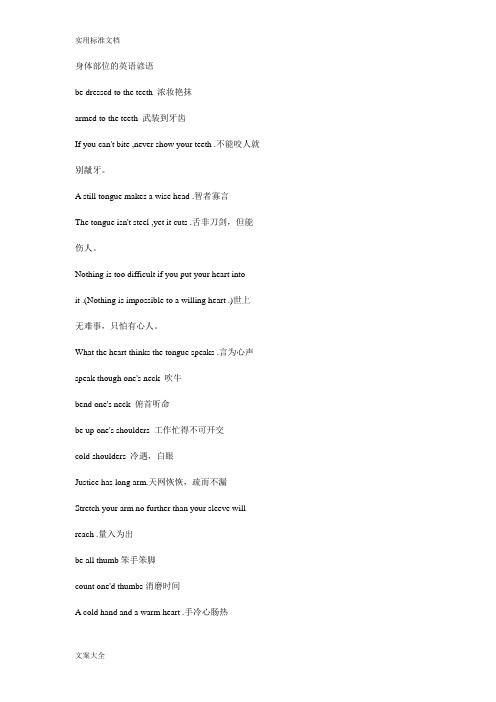
Nothing is too difficult if you put your heart into
it .(Nothing is impossible to a willing heart .)世上
无难事,只怕有心人。
What the heart thinks the tongue speaks .言为心声
A close mouth catches no flies.[谚语]口紧不招祸。
Keep your mouth shut and your eyes open.[谚语]多看少
说
An apple a day keeps doctor away.一天一个苹果,医生
不来找。
Nothing is too diffcult,if you put your heart into
Two heads are better than one.[谚]三个臭皮匠,赛过诸
葛亮。
Hair头发
Hang by a hair千钧一发;岌岌可危;摇摇欲坠。
Take a hair of the dog that bit you.以毒攻毒;以酒解
毒。
Eye眼;目
Better to have one eye than be blind altogether.[谚
A wise head makes a close mouth智者缄言
A wise head makes the tongue short .智者寡言。
A wise man will make tools of what comes to hand .智
者自决,愚者从众。
Walls have ears隔墙有耳a fresh hand新手
与身体部位相关的习语

他为没上得 了大 学这事儿耿耿 于怀。
9 . o l d h a n d老手 。 有经验的人
你 尝过这种冰激 凌吗?这是 最好 的 , 真 的。
例句 : We s h o u l d b e bl a e t o t r u s t S i l v a t o
a f t e r h e ’ S h a d a c o u p l e o f d r i n k s .
不要 气馁 , 亭 睛会 变好的 。 7 . ma k e y o u r b l o o d b o i l 使……怒火 中烧
吉姆 一喝点酒就信 口胡诌。 2 . 1 i v e( f r o m) h a n d t o mo u t h仅够糊 口 , 勉
we r e f o u r k i d s , S O we l i v e d f r o m h a n d t o mo u h. t
他们对待 那些人 的方式令我非 常气愤。
8 . h a v e a c h i p o n y o u r s h o u l d e r( 因觉得
例句 : T h e p o l i s h n e e d s a c e r t a i n a m o u n t o f
e l bo w g r e a s e t o a p p l y .
我们应该相信席 尔瓦会 为我们谈成一笔好 生意——世. 精 于此道 。
强度 日
例句 : T h e w a y t h e y h a v e t r e a t e d t h o s e p e o —
p i e ma k e s my b l o o d b o i l .
有关人体身体部位的英文谚语习语
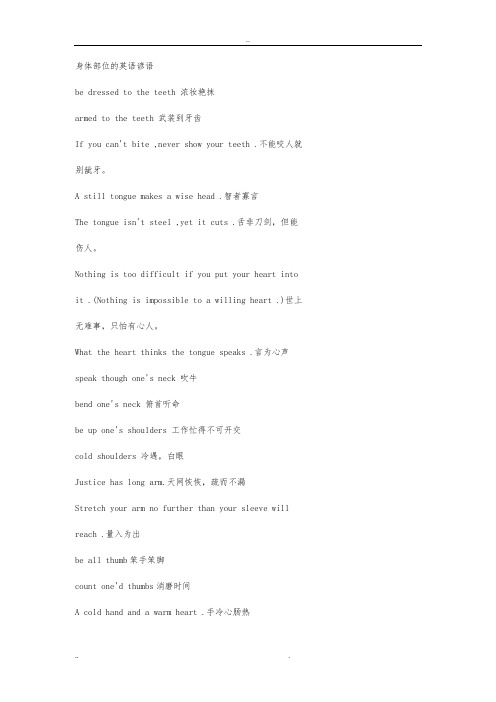
身体部位的英语谚语be dressed to the teeth 浓妆艳抹armed to the teeth 武装到牙齿If you can't bite ,never show your teeth .不能咬人就别龇牙。
A still tongue makes a wise head .智者寡言The tongue isn't steel ,yet it cuts .舌非刀剑,但能伤人。
Nothing is too difficult if you put your heart into it .(Nothing is impossible to a willing heart .)世上无难事,只怕有心人。
What the heart thinks the tongue speaks .言为心声speak though one's neck 吹牛bend one's neck 俯首听命be up one's shoulders 工作忙得不可开交cold shoulders 冷遇,白眼Justice has long arm.天网恢恢,疏而不漏Stretch your arm no further than your sleeve will reach .量入为出be all thumb笨手笨脚count one'd thumbs消磨时间A cold hand and a warm heart .手冷心肠热One hand washes another .有来有往;互相利用fall on one's leg逢凶化吉as fast as one'd legs can carry one 开足马力,拼命跑across one's knee(把小孩)脸朝下放在膝盖上打屁股beat sb to his knees打败某人have a foot in both camps脚踏两只船Better the foot slip than the tongue (Better to slip with the tongue )宁可失足,不可失言。
身体器官功能英文介绍作文
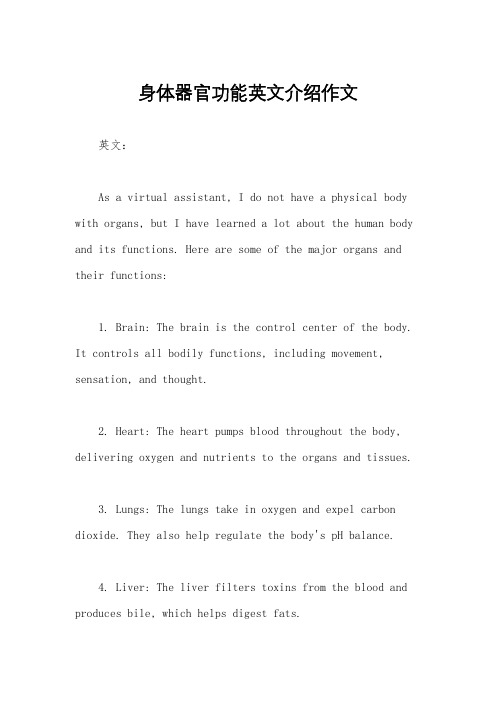
身体器官功能英文介绍作文英文:As a virtual assistant, I do not have a physical body with organs, but I have learned a lot about the human body and its functions. Here are some of the major organs and their functions:1. Brain: The brain is the control center of the body. It controls all bodily functions, including movement, sensation, and thought.2. Heart: The heart pumps blood throughout the body, delivering oxygen and nutrients to the organs and tissues.3. Lungs: The lungs take in oxygen and expel carbon dioxide. They also help regulate the body's pH balance.4. Liver: The liver filters toxins from the blood and produces bile, which helps digest fats.5. Kidneys: The kidneys filter waste products from the blood and regulate the body's fluid balance.6. Stomach: The stomach breaks down food into a liquid mixture that can be absorbed by the intestines.7. Intestines: The intestines absorb nutrients from food and eliminate waste products.8. Pancreas: The pancreas produces insulin, which regulates blood sugar levels.9. Skin: The skin protects the body from external damage and helps regulate body temperature.中文:作为一名虚拟助手,我没有实体的身体器官,但我学到了很多关于人体及其功能的知识。
与身体部位有关的英语俚语.doc
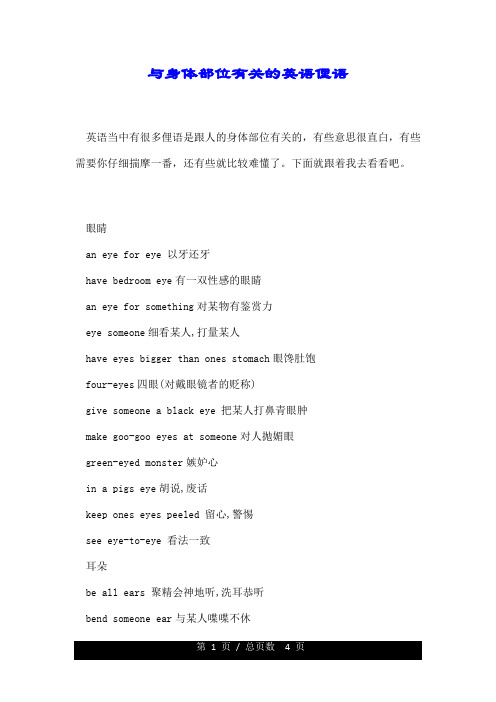
与身体部位有关的英语俚语英语当中有很多俚语是跟人的身体部位有关的,有些意思很直白,有些需要你仔细揣摩一番,还有些就比较难懂了。
下面就跟着我去看看吧。
眼睛an eye for eye 以牙还牙have bedroom eye有一双性感的眼睛an eye for something对某物有鉴赏力eye someone细看某人,打量某人have eyes bigger than ones stomach眼馋肚饱four-eyes四眼(对戴眼镜者的贬称)give someone a black eye 把某人打鼻青眼肿make goo-goo eyes at someone对人抛媚眼green-eyed monster嫉妒心in a pigs eye胡说,废话keep ones eyes peeled 留心,警惕see eye-to-eye 看法一致耳朵be all ears 聚精会神地听,洗耳恭听bend someone ear与某人喋喋不休blow it out ones ear胡说八道chew someones ear off对某人喋喋不休have an ear for music有音乐方面的天赋fall on deaf ears和没有心思的人说话;没被理睬good ear 辨别声音keep ones ear to the ground注意听perk up ones ear引起注意,坚起耳朵play by ear 听过歌曲后,不看乐谱而凭记忆演奏put a bug in someones ear事先给某人暗示;警告某人talk someones ear off因喋喋不休而惹怒某人鼻子as plain as the nose on ones face一目了然,显而易见keep ones nose to the grindstone埋头苦干,勤奋工作"Its on skin off my onse"与我毫无关系take a nose dive突然衰弱,突然变弱have a nose for finding something善于发现某事物nose out 以微弱的优势打败对手,险胜get ones nose in the air媚上傲下的,自负的pay though the nose to花很多钱poke ones nose in someones business干预某人的事物,管闲事 right under ones nose显而易见的,一目了然turn ones nose up at someone or something拒绝某人或某事嘴巴bad-mouth someone说某人坏说,撒布流言蜚语big-mouth 多嘴的人,喋喋不休的down in the mouth神情沮丧的,垂头丧气live hand to-mouth勉强糊口,勉强维持生活mouth off傲慢无礼,顶嘴run off at the mouth滔滔不绝地淡论,没完没了shoot off ones mouth随便乱说,信口开河手at hand紧迫的,重要的give someone a hand 帮助某人hand it to someone佩服某人hands down无疑,当然know something like the back of ones对某事物了如指掌 live hand-to-mouth毫无积蓄,勉强糊口an old hand at something做某事的老手,熟手on hand在手头,现有out of hand失去控制,无法控制the right hand doesnt know what the left handis doing互不通气try ones hand at something试试身手脚get back on ones feet 从失败中重新站起来get cold feet在最后时刻失去勇气,临阵畏缩foot the bill付账,买单get a foot in the door迈向目标的第一步get ones feet wet逐渐熟悉情况hotfoot it急匆匆one foot in the grave一只脚已经踏入坟墓,行将就木put ones foot down禁止,阻止pussy-foot around谨言慎行,拐弯抹角quick on ones own two feet很快想出办法be swept off ones feet被诱惑,被迷住stand on ones own two feet独立自主,自主throw oneself at someones完全屈服于某人,完全拜倒在某人脚下get under ones feet阻碍某人,妨碍某人get off on the wrong foot (朋友之间)刚开始时关系不好分享:微信扫一扫二维码分享到微信好友或朋友圈|来源:网友投稿|下载该文档到电脑(点击下载)。
关于人体部位的英语习语
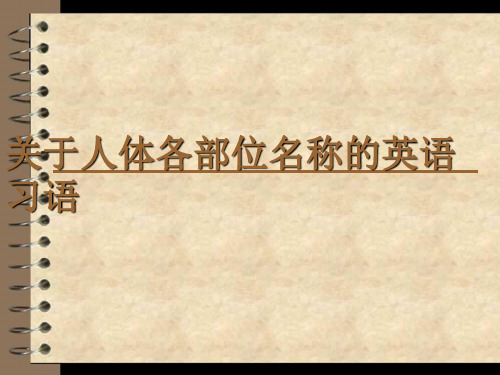
5、内涵丰富,不易理解 To turn the other cheek to sb 对某人宽容大 度 To cool one’s heels 等待休息 6、借助人体机能,激发自然联想 Head and brain 头脑,常与思考联系在一起 Nose 鼻子状的东西,与观察干预侦查联系 在一起
Eye 眼与看、注视、或看到的事物联 系 Ear 耳朵 与听联系 Mouth lips teeth tongue throat gums 发 音器官 与说联系 Heart 心常与认得整体性格,特别是 直觉、情感、精神、勇气、宽厚 或热情联系
4、具有鲜明的名族特色和地方色彩 英国用keep one’s head above water 不背债, 免遭灭顶 To be up to (one’s) ear in debt 深陷债务 To have one’s head screwed on the right way 有头脑,机智的(英国是工业国家, 把人体当成机器。)
有关eye的英语习语 Be up to your eyes in sth 忙于;深陷于; An eye for an eye 以牙还牙 For sb’s eye only 只供某人读或看
Have an eye for sth 对……有鉴赏力 Have an eye on sth 做另一件事得同时(悄悄)注意 Have eyes in your back of your head 脑后长眼;眼光敏锐
othercheeksb对某人宽容大coolonesheels等待休息6借助人体机能激发自然联想headbrain头脑常与思考联系在一起nose鼻子状的东西与观察干预侦查联系在一起eye眼与看注视或看到的事物联ear耳朵与听联系mouthlipsteethtonguethroatgums音器官与说联系heart心常与认得整体性格特别是直觉情感精神勇气宽厚或热情联系hand手使人联想到雇员有技术和有力量的人finger手指头与行事指示捞好处相联stomach胃胃口愿望意向相联系blood血与生命活力勇气相联系bone骨头与本质骨子相联系flesh肌肉与力量相联系nerves神经与感情情绪相联系gall胆汁厚颜无耻的guts内脏与勇气耐力忍耐相联系legfootheel与行走立足立场理据相联系有关head的英语习惯用语bangknockyourtheirheadstogether强行制止人们争吵并使之回复理智bangingyourheadagainstbrickwall用头撞墙
英语习语-身体部位类
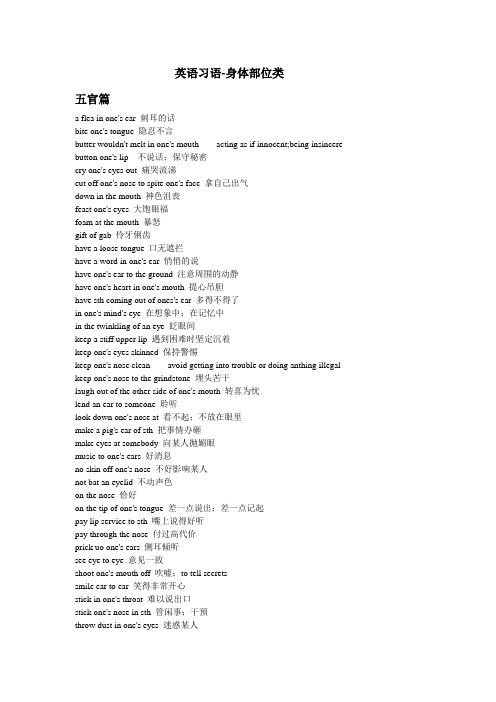
英语习语-身体部位类五官篇a flea in one's ear 刺耳的话bite one's tongue 隐忍不言butter wouldn't melt in one's mouth acting as if innocent;being insincere button one's lip 不说话;保守秘密cry one's eyes out 痛哭流涕cut off one's nose to spite one's face 拿自己出气down in the mouth 神色沮丧feast one's eyes 大饱眼福foam at the mouth 暴怒gift of gab 伶牙俐齿have a loose tongue 口无遮拦have a word in one's ear 悄悄的说have one's ear to the ground 注意周围的动静have one's heart in one's mouth 提心吊胆have sth coming out of ones's ear 多得不得了in one's mind's eye 在想象中;在记忆中in the twinkling of an eye 眨眼间keep a stiff upper lip 遇到困难时坚定沉着keep one's eyes skinned 保持警惕keep one's nose clean avoid getting into trouble or doing anthing illegal keep one's nose to the grindstone 埋头苦干laugh out of the other side of one's mouth 转喜为忧lend an ear to someone 聆听look down one's nose at 看不起;不放在眼里make a pig's ear of sth 把事情办砸make eyes at somebody 向某人抛媚眼music to one's ears 好消息no skin off one's nose 不好影响某人not bat an eyelid 不动声色on the nose 恰好on the tip of one's tongue 差一点说出;差一点记起pay lip service to sth 嘴上说得好听pay through the nose 付过高代价prick uo one's ears 侧耳倾听see eye to eye 意见一致shoot one's mouth off 吹嘘;to tell secretssmile ear to ear 笑得非常开心stick in one's throat 难以说出口stick one's nose in sth 管闲事;干预throw dust in one's eyes 迷惑某人tongue in cheek 无诚意地;粉刺地turn a blind eye to sth 视而不见turn a deaf ear to sth 充耳不闻up to one's ears 深陷于wet behind the ears 乳臭未干win by a nose 险胜with a jaundiced eye 有偏见的with one's nose in the air 目中无人地四肢篇be rushed off one's feet 非常忙bite the hand that feeds one 恩将仇报bring someone to heel 使某人服从burn one's fingers 管闲事或做投机买卖吃亏chance one's arm 冒险一试cool one's heels 久候cost an arm and a leg 价格极其昂贵down at heel 处境穷苦elbow grease 苦干体力活fall head over heels in love with someone 疯狂迷上某人fall upon one's feet 化险为夷feet of clay 大人物的致命弱点foot the bill 买单get one's feet wet 初次做某事;开始做某事get the lead out (of one's feet)动作迅速give someone a hand 帮助a big hand 鼓掌give someone a leg up 帮某人一把grease one's palm 贿赂某人hand in glove 密切合作;相互勾结have cold feet 胆怯have one's hands full 忙得不可开交have the upper hand 处于有利位置head and shoulders above 远远超过hit the nai on the head 正中要害hold ... at arm's length 与...保持距离keep on one's toes keep one attentive, active, busy, or alert know ... like the back of one's hand 了如指掌live from hand to mouth 仅能糊口not have a leg to stand on 站不住脚on one's last legs 垂死;疲惫不堪pull one's leg 开玩笑put one's best foot forward 快点走;全力以赴;留下好印象put one's foot in one's mouth 讲话不得体put one's shoulder to the wheel 全力以赴rap someone over the knuckles 批评某人rub shoulders with someone 与有钱人、名人接触、来往shot in the arm 刺激物show one's hand 摊牌show the cloven foot 露马脚step on one's toes 伤害某人straight from the shoulder 直截了当地说take to one's heels 跑开throw in one's hand 放弃thumb a lift 搭便车thumb one's nose 蔑视twist someone around one's little finger 控制某人twist one's arm 强迫别人做不愿做的事under one's thumb 受某人支配work one's fingers to the bone 拼命工作其他a pat on the back 表扬、赞许的话或动作a slap in the face 羞辱;让人没面子的事情all skin and bones 皮包骨的bad blood 不好的情感be glad to see the back of someone 希望摆脱某人bone up on.. 刻苦用功读书by a hair's breadth 险些...cheek by jowl with 紧紧靠着地come to a head 到关键时刻cudgel one's brains 绞尽脑汁eat one's heart out 悲痛欲绝;嫉妒feel sth in one's bones 有强烈的直觉fly in the face of 公然违抗get it in the neck 受到惩罚get one by the short hairs 使某人就范get one's own back on someone 报复get sth off one's chest 一吐为快grit one's teeth 咬牙坚持have a frog in one's throat 声音嘶哑have a hunch 有预感have egg on one's face 丢脸have one's back to the wall 处境困难have one's head in the clouds 想入非非jump down one's throat 突然动怒;严厉斥责jump out of one's skin 大吃一惊keep a straight face 摆着脸keep body and soul together 勉强糊口keep one's head above water 避免陷入困境long in tooth 上了年纪的make a clean breast of sth 忏悔;招认make no bones about sth 直言不讳make old bones 长寿make one's blood boil 使某人大发雷霆make one's blood run cold 让人胆战心惊make one's hair stand on end 让人毛骨悚然neck or nothing 孤注一掷地not turn a hair 毫不惊慌off the top of one's head 毫无准备地pain in the neck 令人讨厌的事或人save one's skin 使安然无恙set one's teeth one edge 使某人感动不舒服split hairs 钻牛角尖stab one in the back 暗算;背叛stare someone in the face 就在眼前take one's breath away 令人惊叹take the bit between one's teeth 不受控制;下定决心做某事tooth and nail 竭尽全力地touch one's forelock 毕恭毕敬turn one's back on someone 拒绝帮助;不理会turn tail 掉头逃跑until one is blue in the face 极尽努力vent one's spleen 发泄怒气。
与身体部位有关的英语俚语
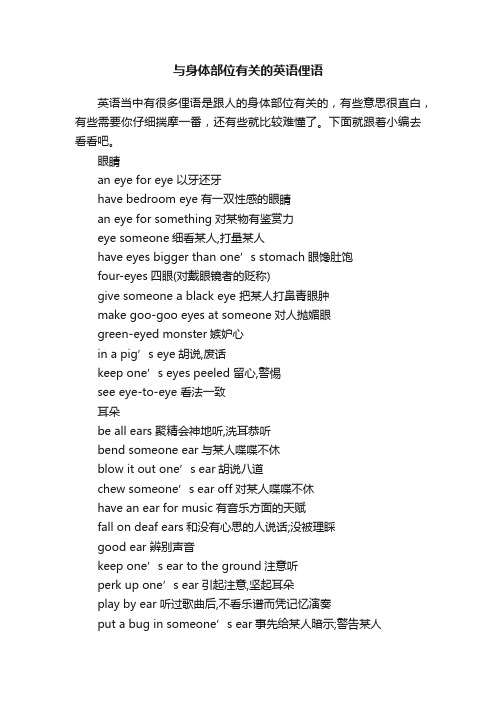
与身体部位有关的英语俚语英语当中有很多俚语是跟人的身体部位有关的,有些意思很直白,有些需要你仔细揣摩一番,还有些就比较难懂了。
下面就跟着小编去看看吧。
眼睛an eye for eye 以牙还牙have bedroom eye有一双性感的眼睛an eye for something对某物有鉴赏力eye someone细看某人,打量某人have eyes bigger than one’s stomach眼馋肚饱four-eyes四眼(对戴眼镜者的贬称)give someone a black eye 把某人打鼻青眼肿make goo-goo eyes at someone对人抛媚眼green-eyed monster嫉妒心in a pig’s eye胡说,废话keep one’s eyes peeled 留心,警惕see eye-to-eye 看法一致耳朵be all ears 聚精会神地听,洗耳恭听bend someone ear与某人喋喋不休blow it out one’s ear胡说八道chew someone’s ear off对某人喋喋不休have an ear for music有音乐方面的天赋fall on deaf ears和没有心思的人说话;没被理睬good ear 辨别声音keep one’s ear to the ground注意听perk up one’s ear引起注意,坚起耳朵play by ear 听过歌曲后,不看乐谱而凭记忆演奏put a bug in someone’s ear事先给某人暗示;警告某人talk someone’s ear off因喋喋不休而惹怒某人鼻子as plain as the nose on one’s face一目了然,显而易见keep one’s nose to the grindstone埋头苦干,勤奋工作“It’s on skin off my onse”与我毫无关系take a nose dive突然衰弱,突然变弱have a nose for finding something善于发现某事物nose out 以微弱的优势打败对手,险胜get one’s nose in the air媚上傲下的,自负的pay though the nose to花很多钱poke one’s nose in someone’s business干预某人的事物,管闲事right under one’s nose显而易见的,一目了然turn one’s nose up at someone or something拒绝某人或某事嘴巴bad-mouth someone说某人坏说,撒布流言蜚语big-mouth 多嘴的人,喋喋不休的down in the mouth神情沮丧的,垂头丧气live hand –to-mouth勉强糊口,勉强维持生活mouth off傲慢无礼,顶嘴run off at the mouth滔滔不绝地淡论,没完没了shoot off one’s mouth随便乱说,信口开河手at hand紧迫的,重要的give someone a hand 帮助某人hand it to someone佩服某人hands down无疑,当然know something like the back of one’s对某事物了如指掌live hand-to-mouth毫无积蓄,勉强糊口an old hand at something做某事的老手,熟手on hand在手头,现有out of hand失去控制,无法控制the right hand doesn’t know what the left handis doing互不通气try one’s hand at something试试身手脚get back on one’s feet 从失败中重新站起来get cold feet在最后时刻失去勇气,临阵畏缩foot the bill付账,买单get a foot in the door迈向目标的第一步get one’s feet wet逐渐熟悉情况hotfoot it急匆匆one foot in the grave一只脚已经踏入坟墓,行将就木put one’s foot down禁止,阻止pussy-foot around谨言慎行,拐弯抹角quick on one’s own two feet很快想出办法be swept off one’s feet被诱惑,被迷住stand on one’s own two feet独立自主,自主throw oneself at someone’s完全屈服于某人,完全拜倒在某人脚下get under one’s feet阻碍某人,妨碍某人get off on the wrong foot (朋友之间)刚开始时关系不好。
与身体部位有关的英语习语

与身体部位有关的英语习语1. HeadThe head is thought to be the most important part of the human body. So a leader is often compared to a head (首脑). Thus we have Head of State or the head of a delegation.The head is where the brain is located. It is naturally associated with ideas and intelligence. Very often, we need other people's ideas and opinions when we want to do something well. The is because two heads are better than one (三个臭皮匠顶个诸葛亮).2. EyeThe eyes are extremely precious to us. That is why we say" Mind your eye (当心)! when we reminding someone to be careful.Not only human beings and animals have eyes, many things also have" eyes"- the eyes ofa ship, the eye of a needle, the eye of a typhoon, and so on.3. EarThe ear is the organ of hearing. A piece of light music is easy on the ear. (悦耳动听). We are usually all ears (专心聆听) for bit news.When they think somebody is overhearing, English people use either of the two proverbs: Walls have ears (隔墙有耳) and Pitchers have ears (壶罐有耳). They also think that little pitchers have big ears(小孩子耳朵尖). Nice boys and girls respect other people. They will not secretly listen to others' private conversations.4. NoseThe English phrase "face to face (面对面)" and its Chinese counterpart(对应)are exactly the same. But English people, to express the same idea, can say nose to nose instead. There is no such substitute in Chinese.The word nose appears in many idioms. Here are two which are quite similar to their Chinese equivalents: lead somebody by the nose (牵着某人的鼻子走) and turn up one's nose at somebody or something (对某人或某物嗤之一鼻).English people can say as plain as the nose in one's face (一清二楚) to mean "very obvious". May be to them, the nose is the most conspicuous part of the face.5. LipWe have two lips: the upper lip and the lower lip. If one's two lips are closed, one cannot speak. So it goes without saying that "don't open your lips (不要开口)" means " don't speak".His lips are sealed. Are his lips really stuck together by wax or glue? No, his lips are sealed when asked about something that he must keep secret. Sometimes a top secret is betrayed because it has escaped someone's lips (脱口而出). Then the incident may become a piece of news that is on everybody's lips (众口相传).6. TongueWe all know we cannot speak without the tongue. So the tongue is closely related to speech. To hold one's tongue (保持沉默) means "to keep silent". A person who has too much tongue (太多嘴) is disliked by all, for he is too talkative. Mother tongue is not the tongue of a mother: it is a person's native language."Don't you have a moth below your nose (你鼻子底下不是有张嘴吗)?" The Chinese say so to blame a person who did not say what he should have said. But this not the right way to express the idea in English. English people would say, "You have a tongue in your head, haven't you?"7. FaceFace has to do with the idea of respect and dignity both in Chinese and English. You lose your face (丢面子) if you fail again and again, but a decisive victory will save your face (挽回面子) after all your failures.When you feel unhappy, you pull a long face (拉长脸). The idea is conveyed in Chinese in the same way. But "about face (向后转)" does not refer to the face. It is a military order to turn round and face in the opposite direction. It is the exact equivalent of " about turn".8. ShoulderThe shoulders can bear heavy things. Your father has a great responsibility for the family on his shoulder. When faced with difficulty, the family should stand shoulder to shoulder (肩并肩) to overcome it. You should not turn a cold shoulder (不理睬) to your family members. Nor should you give your friends the cold shoulder (冷落朋友). Both expressions mean treating others coldly.9. BackA good host is hospitable to his guests. But, if guest is tiresome, the host is glad to see his back (他离开).If your friend has done something really well, you may give him a pat on the back (轻轻拍背部) to show your appreciation.If you turn your back on somebody (不理睬他人), you mean you do not like making friends with that person.10. HeartThe heart is an extremely important organ inside the chest. It usually stands for something important or the centre of something, for example, the heart of the matter (问题的核心) or the heart of mystery.Many other expressions make use of the word heart. A lover can be called a sweet heart (情人). The Purple Heart (紫心徽章) is a medal given as an honor to American soldiers wounded in battle.If your friend is in trouble, you may encourage him by saying "Don't lose heart (不要灰心)."11. StomachThe stomach is naturally related to one's appetite. If you dislike heavy food, you have no stomach for it (反胃). The word is also related to one's interests or likings. If you find something boring or vulgar, you have no stomach for it, either. Bad food turns your stomach. Similarly, your stomach turns at a bad joke.Stomach can also be a verb. Look at this example: "How could you stomach (忍受) such rude words?" Apparently, stomach here can be replaced by "tolerate".12. ArmEvery person has two arms: the right arm and the left arm. The right arm is usually stronger, so we call a good helper the right arm (得力助手).We all know an arm is not very long. But when you keep someone at arm's length (保持距离), the distance is long enough. For that means you don not like that person and you try your best to avoid him or her. We should indeed keep the bad friends at arm's length.13. HandQuite a number of phrases formed form the word hand are very similar to their Chinese counterparts. Here are some obvious examples: a fresh hand (新手), short of hands (人手短缺),hand in hand (手拉手) and wash one's hands of something (洗手不干了). But do not always take this for granted. Study these examples and you will understand.He lives from hand to mouth (He has just enough money to live on). We gave them a big hand (We gave them lots of applause).14. FingerHow many fingers does each of your hands have? Now let's name them in English from the smallest: the little finger, the ring finger, the middle finger, the index finger and thumb.Each finger has its own part to play. If your fingers are all thumbs (笨拙), that is too bad. That means you are very clumsy.15. ThumbChinese people turn up their thumbs to express appreciation. English people do so to express not only appreciation but also approval. Chinese people never turn their thumbs down to mean anything. But English people do. They do so to show depreciation disapproval. Thus in English you can say, "We turn thumbs up (赞成) to Jack's suggestion but they turn thumbs down (不赞成) to it."Similarly, you can warmly praise someone by saying "Thumbs up (真棒)!" and show your dissatisfaction by saying "Thumbs down (差劲)!"16. SkinMost people will only think of the hair on our head when the word hair is mentioned. In fact, some animals and plants also have hair.A horrible scene may make a person's hair stand on end (毛骨悚然). But a courageous person will not turn a hair (不畏惧) even though he is in face of danger.Sometimes, a friend of yours may be so angry that he may act foolishly. Then you had better give him this advice: "Keep your hair on (别发脾气)".Selected from the book The Human Body by Huang Juanhua。
英语习语:与身体部位有关的表达

【导语】做演讲或者和他⼈交流时,我们的肢体语⾔扮演着⼀个很重要的⾓⾊。
当然,眼神交流、⽤⼼倾听等等这些都是必须的。
那么,关于⾝体部位的英语习语,你知道多少呢?以下内容由整理发布,欢迎阅读参考!更多相关讯息请关注!下⾯给⼤家介绍⼀下与⾝体部位有关的⼀些英语习语吧。
An eye for an eye, and we all go blind.以⽛还⽛,两败俱伤。
在《⽼友记》第⼀季中出现过以⽛还⽛的另⼀种表达“tit for tat”。
Beauty is in the eye of the gazer.情⼈的眼⾥出西施。
Walls have ears.隔墙有⽿。
Go in one ear and out the other.左⽿进,右⽿出。
/ 当⽿边风。
A still tongue makes wise head.寡⾔为智。
Be all ears.洗⽿恭听。
Turn a deaf ear.充⽿不闻。
/ 置之不理。
充⽿不闻⽤来形容有意不听别⼈的意见。
Run off at the mouth./ shoot off one’s mouth.信⼝开河。
信⼝开河指说话没有根据;不可靠。
相当于talk at randomDown in/at the mouth垂头丧⽓垂头丧⽓在英语中相当于“depression”Big mouth.⼤嘴巴⼤嘴巴⼀般是指那些守不住秘密的⼈,不会保密,⽼说漏嘴。
(台湾有个嘻哈组合叫⼤嘴巴)Start from scratch./ start empty-handed⽩⼿起家⽩⼿起家原意是指空⼿起家,引申为条件极差的情况下创⽴事业。
Don’t cut off your nose to spite your face.不要害⼈害⼰。
See no further than one’s nose.⿏⽬⼨光。
⿏⽬⼨光⽐喻⽬光短浅,缺乏远见。
Lead someone by the nose牵着⿐⼦⾛牵着⿐⼦⾛常⽤来⽐喻受⼈控制,受⼈⽀配,盲⽬地听命于他⼈。
介绍身体构成英文作文

介绍身体构成英文作文英文回答:The human body is a complex and fascinating system composed of various organs, tissues, and cells. Let me introduce the different components of the body.Firstly, let's talk about the skeletal system. It provides structure and support to the body, consisting of bones, joints, and cartilage. The bones protect our vital organs and allow us to move. For example, the ribcage protects the heart and lungs, while the joints in our knees and elbows enable us to bend and flex.Next, we have the muscular system. It is responsiblefor movement and locomotion. Muscles are made up of muscle fibers that contract and relax to generate force. They allow us to perform everyday tasks like walking, running, and lifting objects. For instance, when we lift weights at the gym, our biceps and triceps muscles are activated.Moving on to the circulatory system, it includes the heart, blood vessels, and blood. The heart pumps oxygenated blood throughout the body, delivering nutrients and removing waste products. The blood vessels, such asarteries and veins, transport the blood. An interesting idiom related to the circulatory system is "to have someone's heart in the right place," which means that someone is kind and compassionate.Now, let's discuss the respiratory system. It enablesus to breathe and exchange oxygen and carbon dioxide. The main organs involved are the lungs, trachea, and bronchi. When we inhale, oxygen enters the lungs, and when we exhale, carbon dioxide is expelled. A common phrase related to breathing is "to catch one's breath," which means to pause and recover after physical exertion.Another important system is the digestive system. It processes food and absorbs nutrients. The digestive organs include the mouth, esophagus, stomach, and intestines. The mouth chews and breaks down food, while the stomach andintestines further digest and absorb nutrients. An example of a common idiom is "to have a gut feeling," which means to have a strong intuition about something.Moving on to the nervous system, it controls and coordinates the body's activities. It includes the brain, spinal cord, and nerves. The brain is the command center, and the spinal cord relays messages between the brain and the rest of the body. An interesting phrase related to the nervous system is "to have butterflies in one's stomach," which means to feel nervous or excited.Lastly, we have the reproductive system, which is responsible for the production of offspring. It differs between males and females. In males, the reproductive organs include the testes, which produce sperm, and the penis. In females, the reproductive organs include the ovaries, which produce eggs, and the uterus. An idiomatic expression related to reproduction is "the birds and the bees," which is a euphemism for explaining sexual reproduction.中文回答:人体是一个复杂而奇妙的系统,由各种器官、组织和细胞组成。
与身体部位有关的习语

与身体部位有关的习语汉语中有许多习语都和身体部位有关,英语也不例外,下面一些例子供大家参考。
1. An eye for eye, a tooth for tooth.以眼还眼,以牙还牙。
例如:A: Are you going to tell John’s supervisor what he did?B: Sure. He told my supervisor when I did the same thing.A: An eye for eye, a tooth for tooth.此句源自《汉莫拉比法典》,指用对方做事的同样方法来报复。
这与汉语中的说法十分相似,很好理解。
2. get cold feet 胆怯;例如:A: What happened to Jim? I thought he would go skydiving with us.B: He got cold feet.有人会因为脚浸入海水觉得冷而放弃游泳,“get cold feet”由“脚变凉“而转到“胆怯”之意,十分形象。
3. I need that like I need a hole in my head.完全不需要。
例如:A: I’m having a hard time deciding what car to get.B: Look at this one. Why not buy it?A: I need that like I need a hole in my head.在头上除了眼,鼻,口之外,不需要别的“洞”了,因此就转为“完全不需要”的意思。
此句生动有趣,在口语中运用一下很不错哦!4. It’s as plain as the nose on your face.很明白,很清楚。
例如:A: Do you think Nancy is going to quit? She hasn’t said anything.B: It’s as plain as the nose on your face.直译为“就像看你脸上的鼻子一样,我看得很清楚。
有关身体部位的英语习语
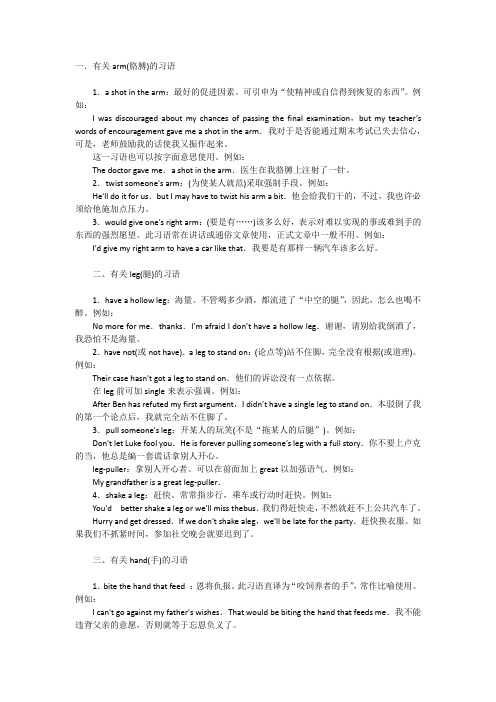
一.有关arm(胳膊)的习语1.a shot in the arm:最好的促进因素。
可引申为“使精神或自信得到恢复的东西”。
例如:I was discouraged about my chances of passing the final examination,but my teacher’s words of encouragement gave me a shot in the arm.我对于是否能通过期末考试已失去信心,可是,老师鼓励我的话使我又振作起来。
这一习语也可以按字面意思使用。
例如:The doctor gave me.a shot in the arm.医生在我胳膊上注射了一针。
2.twist someone's arm:(为使某人就范)采取强制手段。
例如:He'll do it for us.but I may have to twist his arm a bit.他会给我们干的,不过,我也许必须给他施加点压力。
3.would give one's right arm:(要是有……)该多么好,表示对难以实现的事或难到手的东西的强烈愿望。
此习语常在讲话或通俗文章使用,正式文章中一般不用。
例如:I'd give my right arm to have a car like that.我要是有那样一辆汽车该多么好。
二、有关leg(腿)的习语1.have a hollow leg:海量。
不管喝多少酒,都流进了“中空的腿”,因此,怎么也喝不醉。
例如:No more for me.thanks.I'm afraid I don’t have a hollow leg.谢谢,请别给我倒酒了,我恐怕不是海量。
2.have not(或not have).a leg to stand on:(论点等)站不住脚,完全没有根据(或道理)。
例如:Their case hasn't got a leg to stand on.他们的诉讼没有一点依据。
【仁爱英语 七年级上册】课外补充:人体部位英语谚语

课外补充:人体部位英语谚语在我们中国有“失之交臂”、“交头接耳”、“一时失足”等与人体部位有关的成语、谚语。
在英语中也有许多关于人体部位的习语、谚语。
下面就“从头到脚”开始学起。
1.head 头Two heads are better than one.两人智慧胜一人。
(三个臭皮匠,赛过诸葛亮。
)Better be the head of an ass than the tail of a horse.宁为鸡头,不当凤尾。
2.hair头发Take a hair of the dog that bit you.以毒攻毒;以酒解酒。
3.eye眼;目Four eyes see more than two .两个人总比一个人看得全面。
4.face脸;面孔A good fame is better than a good face.美名胜过美貌。
A good face is a letter of recommendation .漂亮的脸蛋就是最好的介绍信。
5.nose鼻子1See no further than one’s nose.鼠目寸光。
6.mouth 嘴;口Keep your mouth shut and your eyes open.多看少说。
7.tooth 牙齿Be dressed to the teeth.浓妆艳抹。
8.heart心;心脏Nothing is too difficult if you put your heart into it.世上无难事,只怕有心人。
9.arm臂,胳膊Justice has long arms.天网恢恢,疏而不漏。
10.h and 手One hand washes another.有来有往,互相利用。
11.l eg腿;腿部Fall on your leg.逢凶化吉。
12.f oot 脚,足Have a foot in both camps.脚踏两只船。
2旗开得胜Better the foot slip than the tongue.宁可失足,不可失言。
与身体部位相关的习语

(一)MOUTH口born with a silver spoon in one's mouth生于富贵之家butter would't melt in sb's mouth看起来老老实实(其实并不见得)by word of mouth口头上down in the mouth沮丧,情绪低落from the horse mouth(指劝告,情报等)来自直接参与者的,从可靠的人那里获得live from hand to mouth仅能满足眼前的需要(尤指食物方面)out of the mouths of babies and sucklings黄口小儿的话也有道理put one's money where one's mouth is以实际行动支持,并非说空话shoot one's mouth off夸张,吹牛take the bread out of sb's mouth使某人无以为生(二)EYE眼the apple of sb's eye心爱的人或物,掌上明珠cry one's eyes out痛哭do sb in the eye伤害某人,羞辱某人an eye for an eye以眼还眼,报复sb's eyes are bigger than his stomach眼大肚小feast one's eyes饱眼福have an eye for sth有眼力,有眼光all my eyes瞎说see eye to eye with sb完全一致,有相同的看法with one's eyes shut轻易地(三)EAR耳be all ears倾听go in one ear and out the other左耳进右耳出have a word in sb.'s ear和某人说悄悄话make a pig's ear of sth弄乱某事物music to one's ear佳音out of one's ear突遭驱除、开除、解雇等smile from ear to ear眉开眼笑walls have ears隔墙有耳with half an ear不很注意地(四)NOSE鼻be no skin of one's nose与己无关,满不在乎by a nose以少许之差cut off one's nose to spite one's face想报复别人而害了自己follow one's nose一直往前走,凭直觉行事have one's nose in sth.专心地阅读某物pay through the nose为某事花钱太多plain as the nose on one's face一清二楚with one's nose in the air非常傲慢keep one's nose clean不做讨厌,违法的事stick one's nose in sth.管闲事(五)FACE脸be staring sb.in the face就在某人面前,十分明显fly in the face of sth.与某事物相悖keep a strange face绷着脸,忍住不笑laugh on the other side of one's face转喜为忧on the face of it就表面判断shut the door in sb's face拒绝与某人谈话a slap in the face冷落,侮辱till one is blue in the face努力和持久到了极点wipe sth.off the face of the earth彻底消除某事物set one's face against sb./sth.坚决反对某人或某物再加:up to one's eyes in work非常忙with the naked eye用肉眼be a real eye opener使人大开眼界的经历have one's eye on留心着in one's mind's eye在脑海里keep an eye on照看,留神turn a blind eye to sth.对……视而不见(六)综合1. all thumbs (笨手笨脚)2. apple of the eye (掌上明珠,宝贝)3. armed to the teeth (全副武装)4. bee's knees (最最了不起的人或事物;顶尖儿)5. between cup and lip (在将成未成之际)6. bring someone to heel (使某人就范)7. burn one's fingers (由于多管闲事或愚蠢行为而吃苦头)8. chance one's arms (冒险一试;碰碰运气)9. hand to mouth (仅够糊口地) 10. fall on one's feet (特别走运;化险为夷)11. An eye for eye, a tooth for tooth.以眼还眼,以牙还牙。
- 1、下载文档前请自行甄别文档内容的完整性,平台不提供额外的编辑、内容补充、找答案等附加服务。
- 2、"仅部分预览"的文档,不可在线预览部分如存在完整性等问题,可反馈申请退款(可完整预览的文档不适用该条件!)。
- 3、如文档侵犯您的权益,请联系客服反馈,我们会尽快为您处理(人工客服工作时间:9:00-18:30)。
和身体器官有关的英语习语1.turn one's back on sb.从字面上解释,意思是"把自己的背对着某人".实际上这是指"不理会某人,或不肯给那个有困难的人任何帮助".例如: I'll ever forgive my elder brother ——he turned his back on me and refused to lend me any help when I lost my job.我永远也不会原谅我哥哥.当我失去工作的时候,他根本不肯帮忙,一点钱都不愿意借给我.2. be fed up to the back teeth意思是extremely irritated and fed up with something or someone 烦透了某人或某事例子:I'm fed up to the back teeth with my job.我烦透了现在的工作.3. have one's heart in the right place从表面意思看就是“一个人的心在恰当的位置”,也就是“心肠好、善良”的意思。
例如: Tom looks very rough but his heart is in the right place.汤姆看起来凶巴巴的,但是心肠很好.4. have one's tongue in one's cheek意思是:半开玩笑,调侃I don't think he was serious when he said that. I think he probably had his tongue in his cheek.与身体部位有关的英语习语1. HeadThe head is thought to be the most important part of the human body. So a leader is often compared to a head (首脑). Thus we have Head of State or the head of a delegation.The head is where the brain is located. It is naturally associated with ideas and intelligence. Very often, we need other people's ideas and opinions when we want to do something well. The is because two heads are better than one (三个臭皮匠顶个诸葛亮).2. EyeThe eyes are extremely precious to us. That is why we say" Mind your eye (当心)! when we reminding someone to be careful.Not only human beings and animals have eyes, many things also have" eyes"- the eyes of a ship, the eye of a needle, the eye of a typhoon, and so on.3. EarThe ear is the organ of hearing. A piece of light music is easy on the ear. (悦耳动听). We are usually all ears (专心聆听) for bit news.When they think somebody is overhearing, English people use either of the two proverbs: Walls have ears (隔墙有耳) and Pitchers have ears (壶罐有耳). They also think that little pitchers have big ears(小孩子耳朵尖). Nice boys and girls respect other people. They will not secretly listen to others' private conversations.4. NoseThe English phrase "face to face (面对面)" and its Chinese counterpart (对应)are exactly the same. But English people, to express the same idea, can say nose to nose instead. There is no such substitute in Chinese.The word nose appears in many idioms. Here are two which are quite similar to their Chinese equivalents: lead somebody by the nose (牵着某人的鼻子走) and turn up one's nose at somebody or something (对某人或某物嗤之一鼻).English people can say as plain as the nose in one's face (一清二楚) to mean "very obvious". May be to them, the nose is the most conspicuous part of the face.5. LipWe have two lips: the upper lip and the lower lip. If one's two lips are closed, one cannot speak. So it goes without saying that "don't open your lips (不要开口)" means " don't speak".His lips are sealed. Are his lips really stuck together by wax or glue? No, his lips are sealed when asked about something that he must keep secret. Sometimes a top secret is betrayed because it has escaped someone's lips (脱口而出). Then the incident may become a piece of news that is on everybody's lips (众口相传).6. TongueWe all know we cannot speak without the tongue. So the tongue is closely related to speech. To hold one's tongue (保持沉默) means "to keep silent". A person who has too much tongue (太多嘴) is disliked by all, for he is too talkative. Mother tongue is not the tongue of a mother: it is a person's native language."Don't you have a moth below your nose (你鼻子底下不是有张嘴吗)?" The Chinese say so to blame a person who did not say what he should have said. But this not the right way to express the idea in English. English people would say, "You have a tongue in your head, haven't you?"7. FaceFace has to do with the idea of respect and dignity both in Chinese and English. You lose your face (丢面子) if you fail again and again, but a decisive victory will save your face (挽回面子) after all your failures.When you feel unhappy, you pull a long face (拉长脸). The idea is conveyed in Chinese in the same way. But "about face (向后转)" does not refer to the face. It is a military order to turn round and face in the opposite direction. It is the exact equivalent of " about turn".8. ShoulderThe shoulders can bear heavy things. Your father has a great responsibility for the family on his shoulder. When faced with difficulty, the family should stand shoulder to shoulder (肩并肩) to overcome it. You should not turn a cold shoulder (不理睬) to your family members. Nor should you give your friends the cold shoulder (冷落朋友). Both expressions mean treating others coldly.9. BackA good host is hospitable to his guests. But, if guest is tiresome, the host is glad to see his back (他离开).If your friend has done something really well, you may give him a pat on the back (轻轻拍背部) to show your appreciation.If you turn your back on somebody (不理睬他人), you mean you do not like making friends with that person.10. HeartThe heart is an extremely important organ inside the chest. It usually stands for something important or the centre of something, for example, the heart of the matter (问题的核心) or the heart of mystery.Many other expressions make use of the word heart. A lover can be called a sweet heart (情人). The Purple Heart (紫心徽章) is a medal given as an honor to American soldiers wounded in battle.If your friend is in trouble, you may encourage him by saying "Don't lose heart (不要灰心)."11. StomachThe stomach is naturally related to one's appetite. If you dislike heavy food, you have no stomach for it (反胃). The word is also related to one's interests or likings. If you find something boring or vulgar, you have no stomach for it, either. Bad food turns your stomach. Similarly, your stomach turns at a bad joke.Stomach can also be a verb. Look at this example: "How could you stomach (忍受) such rude words?" Apparently, stomach here can be replaced by "tolerate".12. ArmEvery person has two arms: the right arm and the left arm. The right arm is usually stronger, so we call a good helper the right arm (得力助手).We all know an arm is not very long. But when you keep someone at arm's length (保持距离), the distance is long enough. For that means you don not like that person and you try your best to avoid him or her. We should indeed keep the bad friends at arm's length.13. HandQuite a number of phrases formed form the word hand are very similar to their Chinese counterparts. Here are some obvious examples: a fresh hand (新手), short of hands (人手短缺), hand in hand (手拉手) and wash one's hands of something (洗手不干了). But do not always take this for granted. Study these examples and you will understand.He lives from hand to mouth (He has just enough money to live on). We gave them a big hand (We gave them lots of applause).14. FingerHow many fingers does each of your hands have? Now let's name them in English from the smallest: the little finger, the ring finger, the middle finger, the index finger and thumb.Each finger has its own part to play. If your fingers are all thumbs (笨拙), that is too bad. That means you are very clumsy.15. ThumbChinese people turn up their thumbs to express appreciation. English people do so to express not only appreciation but also approval. Chinese people never turn their thumbs down to mean anything. But English people do. They do so to show depreciation disapproval. Thus in English you can say, "We turn thumbs up (赞成) to Jack's suggestion but they turn thumbs down (不赞成) to it."Similarly, you can warmly praise someone by saying "Thumbs up (真棒)!" and show your dissatisfaction by saying "Thumbs down (差劲)!"16. SkinMost people will only think of the hair on our head when the word hair is mentioned. In fact, some animals and plants also have hair.A horrible scene may make a person's hair stand on end (毛骨悚然). But a courageous person will not turn a hair (不畏惧) even though he is in face of danger.Sometimes, a friend of yours may be so angry that he may act foolishly. Then you had better give him this advice: "Keep your hair on (别发脾气)". Selected from the book The Human Body by Huang Juanhuaear-to-ear: from one ear to the otherWhen i walked in, my mother was smiling from ear-to ear.( had an enormous smile on her face)hand in hand: to walk while hoding hands with someone.They must be very good friends. they're walking hand-in-hand.neck-and-neck(to be): to be even in a race.The two runners are neck-to-neck. Iwonder who will be the win趣味英语:和身体部位有关的英语常用成语1. Turn left at the next corner and then follow your nose, you can't miss it.到前面的路口向左转,然后一直走就到了,你不会看不到的.to follow one's nose 在这个句子里的意思就是"一直走".to follow one's nose 还可以解释为利用嗅觉找到某物.例如:You say you are looking for the French Bakery? Just walk two blocks north, and you can smell that wonderful smell of fresh bread baking: just follow your nose and it will bring you right to the front door.你是说你在找那个法国面包店吗?往北走过两条街,你就会闻到烤面包的香味.随着香味走就会把你带到那个面包店的门口了.to follow one's nose 在这个句子里着重的是嗅觉,而不是方向.2. How many times have I told you to get to work on time? But my words just go in one ear and out the other. So I don't have any choice but to fire you.我告诉你多少次了上班要准时?可是,你对我的话总是一只耳朵进一只耳朵出.现在,我没有办法了,只好解雇你了.汉语里经常说那些不听劝告的人对别人的话总是"一只耳朵进一只耳朵出",或者说:"左耳朵进,右耳朵出."英语里也有这样的说法, 即:"It goes in one ear and out the other".3. If you shoot your mouth off like that one more time, I won't tell you anything in the future.要是你再这么胡说八道,以后我什么也不告诉你了.to shoot one's mouth off 是指一个人在某种场合滔滔不绝地说一些不合时宜的话,或者说一些不该讲的话.4. When Joe went to his new job, he got off on the wrong foot. On the first morning he upset his new boss by arriving at the store two hours late. And right now he's out looking for a job again.乔找到了一份新的工作,可是他刚开始到那家店里去上班时就给人一个坏印象.第一天上班,他就晚到两个小时,让他的老板好不高兴.现在他又在找工作了.to get off on the wrong foot 是指一个人在做某件事的时候一开始就给人一个坏印象,或者一开始就把事弄糟了.5. The place I enjoyed most was the National Gallery of Art. I spent a whole afternoon there feasting my eyes on all their modern paintings.我最喜欢的地方是国家艺术馆.我花了整整一个下午在那里欣赏他们的现代绘画,真是一饱眼福.feast 的意思是:宴请,举行盛大的筵席,或使人得到享受等,宴请你的眼睛,使你的眼睛得到享受,实际上也就是"一饱眼福"的意思.to feast one's eyes on 这个说法可以应用到各个方面,比如欣赏自然风光、观赏艺术作品等.。
